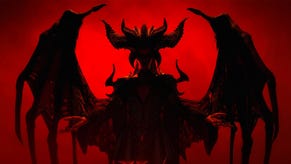The dog track: Q1 and the next-gen countdown
The first quarter of a year is relatively dead for game releases, but Q1 2013 is teeming with top talent. VG247's Dave Cook asks if this busy period signifies the countdown to next-gen.
It's funny how big a difference a day makes. Most of us can't wait to get through the expensive holiday season, share in fun with our friends, drink ourselves stupid and vow that next year we absolutely will go to the gym or stop smoking.
Then January 1 rolls around and it's business as usual. We're usually worse off financially, hung over, shattered and in desperate need of something fried to eat. The games industry used feel this hangover too, as it usually crawls out of bed about February and starts rolling along as if nothing happened, but 2013 will be different.
It's about now that we in the gaming press let out a sigh of relief and look forward to a month or two of respite and rest, but looking forward to the first quarter - which is January to March by the way - the industry shows no signs of slowing down. At all.
There are many top-billing games out during that period, including DmC: Devil May Cry, BioShock Infinite, Metal Gear Rising: Revengeance, Tomb Raider, Ni no Kuni: Wrath of the White Witch, Aliens: Colonial Marines, SimCity, Rayman Legends, Gears of War: Judgment and God of War: Ascension to name just a few.
What about after that?
The triple-A schedule is barren after March, the recently-launched Wii U aside. That's not to say that nothing will release - it's just that there are few games with a solid release date beyond that month. Dead Island: Riptide is the only sizeable console release I can see with a firm launch date in place.
Why do we know nothing about what's to follow?
It's because next-gen really is coming.
The wheels are firmly in motion now, and studios have shifted focus to new hardware and new possibilities. The signs are all around you: from the unveiling of Unreal Engine 4 and the Luminous Engine by Square Enix, the slowing string of console exclusives on Xbox 360 and the silence from big players like Bungie.
We also have it on good authority that PS4 is getting a reveal before E3 next year, and that the specs are looking powerful indeed. In fact, we published an entire piece on what we know so far, and it points to some rather interesting developments on the horizon. Add to that the lack of Sony-exclusive IP launch after March 2013 - there are no games currently dated - and it's clear the big players are readying for change.
When you consider the eleventh hour of old formats - take PS2 for example - it's not uncommon to see a final push of strong IP that fully takes advantage of what hardware has to offer. After all, developers have spent almost a decade trying to figure out Xbox 360, and comparing its launch slate to games coming out now almost looks like a generational leap in itself.
But Microsoft's rig has reached its limit. Developers and publishers often state to the contrary, but when games on the format become too vast - just look at the increasing need for multi-disc Xbox 360 releases for one - then it becomes apparent that new media and hardware is in demand.
It seems that a month can't go by without someone unearthing a dusty old patent for wearable hardware or a tantalising next-gen rumour that something big is in the works at Microsoft and Sony.
But you don't need to theorise about Xbox 720 and PS4's reveals. The signs are already around you that it isn't far off, and if I were a betting man I'd say that - based on what we're seeing in plain sight - that an E3 2013 reveal is likely, closely followed by a rumoured autumn launch.
By 'plain sight' I mean that Microsoft has been morphing its approach right under our noses in preparation for whatever comes next. Look at SmartGlass - a utility that lets users combine their tablet and their Xbox 360 to create an asynchronous (there's that word again) experience. Stack that against leaked documents from earlier this year that suggest the next Xbox will feature a tablet controller and the move seems less coincidental. (Thanks to LiveSide for the document link)
Microsoft's addition of cloud storage seems to fit with the approach taken by Sony in its $380 million acquisition of Dave Perry's GaiKai technology, Steam's cloud-based functionality, and a swelling base of cloud experiences on iOS and Android. It's clear that the cloud will be a prominent feature moving forward, but the evidence doesn't stop with storage.
Xbox Music launched last month to go up against the might of Spotify and iTunes, offering a cloud-streaming service with a vast library of tracks. if Microsoft feels the need to launch a service like this - although some critics suggest it's p**sing into the wind - then it must have a future road map for the tech or service going forward. The service can't have been cheap after all.
The circle begins to close as you realise that Xbox Music is available across Microsoft's suite of devices and software - across Windows 8-enabled PCs, phones and even Surface - a whole family of connected devices that talk to each other and feature a range of asynchronous (there's that word again) functions.
Wii U is lambasted the world over by critics of its tablet controller, but let me ask you this: how often do you sit playing a game, get stuck and then reach to your phone or tablet to look up a strategy guide or its wiki page?
Now imagine a format where you can do this without having to reach for that secondary, third party device made by Apple or Samsung, or get up to sit at your PC to get the information you need.
Microsoft doesn't want your attention to waver for a second. It doesn't want you to use someone else's hardware to get the most out of its console, it wants a captive audience, and spreading its experience over a whole range of devices is exactly what it's doing right now.
The company is blasting all sectors of the market - from consoles, streaming services and PCs, even TV set-top boxes if rumours are to believed - and the only piece of this Windows 8 jigsaw left to fit into place is the Xbox 720.
It's coming, you better believe it's coming, because the market is ready for it. Just don't be surprised to see a tablet controller bundled with it when it does arrive, because it makes sense given our almost symbiotic relationship with intuitive touch screen devices like our phone or tablet.
Consider this: consoles have evolved dramatically over the years - with new features, increased spec and technical clout - but there is one vital element that hasn't changed very much during this time, and that is the controller.
It's the last vital component of consoles that Microsoft or any manufacturer can change - without releasing some brand of mad holographic play, or AR function (that's currently Valve's department) - so it makes sense that Microsoft would consider a tablet option.
We're about to enter that last, insane dash towards the future of gaming, and while it means more work for your friendly neighbourhood VG247 news team, it's going to be a thoroughly exciting race to witness.
Credit to Saris0000 for the banner image.










